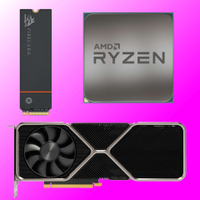Alan Wake 2's PC requirements may leave AMD RX 5000-series and Nvidia GTX 10-series users high and dry
A potential lack of mesh shader support may leave older generation cards out in the cold.

When Alan Wake 2's PC requirements were announced last Friday they caused quite the stir amongst the PC gaming community, with some decrying a perceived lack of optimisation and unrealistic hardware expectations as a sign of a troubled release to come. However, those of you running an Nvidia RTX 10-series GPU or even a more recent AMD RX 5000-series may have further reason to be glum, as according to a now-deleted tweet (are we still calling them tweets?) from a Remedy developer, the upcoming release may be dependent on mesh shader support to run at all.
Eagle-eyed Redditors have been sharing screenshots of a deleted post created by @newincpp, a developer at Remedy Games, in which they reveal that the 10-series and 5000-series cards don't appear on the specs because they don't support mesh shading.
A slight olive branch is offered later in the thread, with the speculation that a vertex shader path is still within the game but was dropped due to performance issues, so it may be possible for modders to revive it in future. However, as things stand this still looks like bad news for anyone hoping to play Alan Wake 2 on older generation graphics cards.
Mesh shaders were first included as part of the release of DirectX 12 Ultimate back in 2020, with the first code samples released in January 2021. They were designed to replace traditional vertex and geometry shaders in the render pipeline, allowing developers to optimise the rendering process. However, this new technique requires explicit GPU support, and for Nvidia this means Turing and above, i.e. the RTX 20- series, and for AMD, the RX 6000-series onwards. If this latest info is to be believed, Alan Wake 2 has forgone all other forms of shading entirely, and this may well freeze out users of older cards.
We've reached out to Remedy for comment, but in the meantime it looks like those of you thinking about playing Alan Wake 2 might need to look at upgrades for multiple reasons, not least because it looks extremely demanding even for relatively modern machines. Whether these hardware requirements are justified by a truly next-gen graphical experience remains to be seen.
Best CPU for gaming: Top chips from Intel and AMD.
Best gaming motherboard: The right boards.
Best graphics card: Your perfect pixel-pusher awaits.
Best SSD for gaming: Get into the game first.
Keep up to date with the most important stories and the best deals, as picked by the PC Gamer team.

Andy built his first gaming PC at the tender age of 12, when IDE cables were a thing and high resolution wasn't—and he hasn't stopped since. Now working as a hardware writer for PC Gamer, Andy's been jumping around the world attending product launches and trade shows, all the while reviewing every bit of PC hardware he can get his hands on. You name it, if it's interesting hardware he'll write words about it, with opinions and everything.


